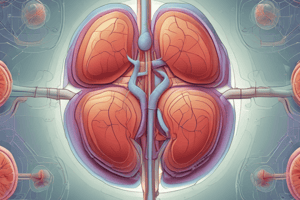Podcast
Questions and Answers
What effect does increased sympathetic innervation have on renal function?
What effect does increased sympathetic innervation have on renal function?
- Increases sodium excretion
- Increases glomerular filtration rate (GFR)
- Decreases tubular reabsorption of salt and water
- Causes constriction of renal arterials (correct)
How does angiotensin II influence sodium excretion?
How does angiotensin II influence sodium excretion?
- It increases sodium excretion directly
- It has no effect on sodium excretion
- It reduces renal blood flow, promoting sodium loss
- It stimulates the release of aldosterone, increasing sodium retention (correct)
What role does antidiuretic hormone (ADH) play in kidney function?
What role does antidiuretic hormone (ADH) play in kidney function?
- Facilitates the production of a small volume of concentrated urine (correct)
- Promotes large volumes of dilute urine
- Decreases the formation of concentrated urine
- Increases sodium reabsorption in the glomerulus
What is the effect of increased sodium intake on angiotensin II formation?
What is the effect of increased sodium intake on angiotensin II formation?
What occurs if antidiuretic hormone (ADH) is blocked during water deprivation?
What occurs if antidiuretic hormone (ADH) is blocked during water deprivation?
What primarily maintains potassium secretion during high sodium intake despite decreased aldosterone secretion?
What primarily maintains potassium secretion during high sodium intake despite decreased aldosterone secretion?
What effects hypocalcemia has on neuromuscular excitability?
What effects hypocalcemia has on neuromuscular excitability?
Which form of calcium is biologically active at cell membranes?
Which form of calcium is biologically active at cell membranes?
What percentage of potassium is typically found in the extracellular fluid?
What percentage of potassium is typically found in the extracellular fluid?
What substance primarily stimulates the release of parathyroid hormone in cases of hypercalcemia?
What substance primarily stimulates the release of parathyroid hormone in cases of hypercalcemia?
What role does insulin play in potassium regulation?
What role does insulin play in potassium regulation?
How is most calcium in the body primarily stored?
How is most calcium in the body primarily stored?
What effect does alkalosis have on calcium levels?
What effect does alkalosis have on calcium levels?
Where is the most important site for the regulation of potassium excretion?
Where is the most important site for the regulation of potassium excretion?
Where does calcium reabsorption occur in the kidneys?
Where does calcium reabsorption occur in the kidneys?
What condition can occur if potassium levels in the extracellular fluid are not rapidly adjusted?
What condition can occur if potassium levels in the extracellular fluid are not rapidly adjusted?
What primarily influences calcium reabsorption in the distal tubule?
What primarily influences calcium reabsorption in the distal tubule?
How does strenuous exercise affect potassium levels?
How does strenuous exercise affect potassium levels?
What triggers potassium uptake in the principal cells of the distal tubules?
What triggers potassium uptake in the principal cells of the distal tubules?
Which dietary factor can increase the rate of potassium excretion?
Which dietary factor can increase the rate of potassium excretion?
What happens to potassium levels after a meal high in potassium?
What happens to potassium levels after a meal high in potassium?
What primarily controls phosphate excretion?
What primarily controls phosphate excretion?
What is the transport maximum of renal tubules for phosphate?
What is the transport maximum of renal tubules for phosphate?
Which hormone increases phosphate excretion by the kidneys?
Which hormone increases phosphate excretion by the kidneys?
How does increased fluid intake affect blood volume and blood pressure?
How does increased fluid intake affect blood volume and blood pressure?
What happens when blood volume rises significantly above normal levels?
What happens when blood volume rises significantly above normal levels?
Which factors affect fluid movement into the interstitial spaces?
Which factors affect fluid movement into the interstitial spaces?
In response to decreased fluid intake, what happens to blood pressure?
In response to decreased fluid intake, what happens to blood pressure?
How do the kidneys adapt to maintain fluid balance?
How do the kidneys adapt to maintain fluid balance?
What is the role of extracellular potassium concentration in potassium secretion?
What is the role of extracellular potassium concentration in potassium secretion?
Which factor is NOT a major contributor to the regulation of potassium secretion?
Which factor is NOT a major contributor to the regulation of potassium secretion?
How does aldosterone affect potassium levels in the kidneys?
How does aldosterone affect potassium levels in the kidneys?
Which of the following accurately describes the effect of increased plasma aldosterone concentration?
Which of the following accurately describes the effect of increased plasma aldosterone concentration?
What is the primary role of principal cells in potassium regulation?
What is the primary role of principal cells in potassium regulation?
What happens to potassium secretion in the absence of adequate aldosterone secretion?
What happens to potassium secretion in the absence of adequate aldosterone secretion?
Which condition can lead to an increase in distal tubule flow rate?
Which condition can lead to an increase in distal tubule flow rate?
What is the effect of high extracellular potassium concentration on the sodium-potassium pump?
What is the effect of high extracellular potassium concentration on the sodium-potassium pump?
Flashcards
Potassium diffusion
Potassium diffusion
Movement of potassium ions through renal outer medullary channels.
Principal cells
Principal cells
Cells in the distal and collecting tubules that regulate potassium excretion.
Sodium-potassium pump
Sodium-potassium pump
Membrane protein that pumps sodium out and potassium in the cells.
Aldosterone
Aldosterone
Signup and view all the flashcards
Extracellular potassium concentration
Extracellular potassium concentration
Signup and view all the flashcards
Electrochemical gradient
Electrochemical gradient
Signup and view all the flashcards
Tubular flow rate
Tubular flow rate
Signup and view all the flashcards
Negative feedback control
Negative feedback control
Signup and view all the flashcards
Sympathetic innervation of kidneys
Sympathetic innervation of kidneys
Signup and view all the flashcards
Angiotensin II
Angiotensin II
Signup and view all the flashcards
Effect of sodium intake on angiotensin II
Effect of sodium intake on angiotensin II
Signup and view all the flashcards
Antidiuretic hormone (ADH)
Antidiuretic hormone (ADH)
Signup and view all the flashcards
Atrial natriuretic peptide (ANP)
Atrial natriuretic peptide (ANP)
Signup and view all the flashcards
Normal potassium levels
Normal potassium levels
Signup and view all the flashcards
Hyperkalemia
Hyperkalemia
Signup and view all the flashcards
Intracellular potassium
Intracellular potassium
Signup and view all the flashcards
Renal excretion of potassium
Renal excretion of potassium
Signup and view all the flashcards
Insulin's role in potassium
Insulin's role in potassium
Signup and view all the flashcards
Beta blockers and potassium
Beta blockers and potassium
Signup and view all the flashcards
Potassium secretion process
Potassium secretion process
Signup and view all the flashcards
Rate of potassium filtration
Rate of potassium filtration
Signup and view all the flashcards
Phosphate Excretion Control
Phosphate Excretion Control
Signup and view all the flashcards
Transport Maximum
Transport Maximum
Signup and view all the flashcards
Parathyroid Hormone Role
Parathyroid Hormone Role
Signup and view all the flashcards
Extracellular Fluid Volume
Extracellular Fluid Volume
Signup and view all the flashcards
Glomerular Filtration Rate (GFR)
Glomerular Filtration Rate (GFR)
Signup and view all the flashcards
Pressure Diuresis
Pressure Diuresis
Signup and view all the flashcards
Capillary Hydrostatic Pressure
Capillary Hydrostatic Pressure
Signup and view all the flashcards
Interstitial Fluid Reservoir
Interstitial Fluid Reservoir
Signup and view all the flashcards
Potassium secretion
Potassium secretion
Signup and view all the flashcards
Effect of sodium intake
Effect of sodium intake
Signup and view all the flashcards
Hypocalcemia effects
Hypocalcemia effects
Signup and view all the flashcards
Ionized calcium
Ionized calcium
Signup and view all the flashcards
Calcium excretion
Calcium excretion
Signup and view all the flashcards
Parathyroid hormone (PTH) role
Parathyroid hormone (PTH) role
Signup and view all the flashcards
Calcium reabsorption sites
Calcium reabsorption sites
Signup and view all the flashcards
Alkalosis impact on calcium
Alkalosis impact on calcium
Signup and view all the flashcards
Study Notes
Renal Regulation of Electrolytes
- Potassium levels typically range from 4.2 to 4.5 mEq/L, with slight fluctuations.
- A single meal can significantly increase potassium intake (up to 50 mEq).
- Rapid adjustment of potassium levels is crucial; failure can lead to hyperkalemia and cardiac arrest.
- 98% of total body potassium is intracellular; redistribution between compartments is a crucial initial defense mechanism.
- Potassium excretion is primarily handled by the kidneys (5-10% is excreted via feces).
- After ingestion, potassium quickly enters cells; renal excretion is the primary method of regulation.
- Insulin and beta-adrenergic stimulation influence potassium uptake into cells.
- Strenuous exercise triggers potassium leakage from skeletal muscles.
- Potassium filtration rate is a key factor in excretion.
- The proximal tubules and loop of Henle maintain constant reabsorption, while late distal and cortical collecting tubules primarily regulate secretion (reabsorption or secretion based on body needs).
- Potassium excretion can exceed the rate of glomerular filtration
- Potassium secretion in principal cells:
- A two-step process, involving uptake across the basal membrane, and passive diffusion into the tubule fluid.
- Influenced by sodium-potassium pump activity; electrochemical gradient from blood to tubule; tubular membrane permeability.
- Controlling factors for potassium excretion are primarily:
- Extracellular potassium concentration
- Aldosterone
- Tubular flow rate
Other Electrolyte Regulation
- Calcium is not secreted by the kidneys; excreted amount depends on filtration and reabsorption rates.
- Reabsorption primarily occurs in proximal, loop of Henle, and distal tubules.
- Calcium reabsorption occurs via paracellular pathway dissolved in water; intracellular passive diffusion, aided by calcium ATPase and sodium calcium co-transporter.
- Parathyroid hormone plays a crucial role in calcium regulation (reabsorption, bone uptake/release).
- Phosphate excretion is regulated by an overflow mechanism; amount filtered exceeding transport maximum results in excretion.
- Phosphate transport is typically continuous.
Hormone Influence on Electrolyte Regulation
- Aldosterone: increased potassium concentration stimulates its release, and it increases tubular potassium secretion.
- ADH: maintains fluid balance; critical for overall extracellular fluid volume, blood volume, arterial pressure regulation.
- Angiotensin II: a powerful controller of sodium excretion; reduced sodium intake elevates angiotensin II production. Elevated sodium intake correspondingly decreases it.
- Other hormones (e.g., parathyroid hormone) play a role in regulating calcium excretion and other electrolyte homeostasis mechanisms.
Studying That Suits You
Use AI to generate personalized quizzes and flashcards to suit your learning preferences.



